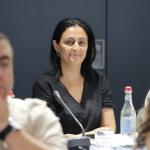Education in Emergency Conditions
Primary tabs
We live in emergency conditions. This is our life and we have to accept the reality in which we live. To accept does not mean to reconcile, but to clearly and realistically see the reality so that we will be able to change it with simple and real steps.
Two year ago, I would never think I would write on this topic, that this war, this pandemic would enter my life and my learners’ lives and families, and that the learners would ask questions about death and war. Now I understand that we live in a complicated stage of emergency and post-emergency conditions following each other or are mixed with each other. We live in daily losses, pain, uncertainty, stress when working and finding work energy is unspeakably difficult.
Everything gets more difficult when you are a teacher, an organizer of education, and your daily work is with students, who look at you with eyes full of questioning, ask these questions the answers to which you don’t know yourself.
We can’t pretend to live and study in another reality: education is an individual’s life with its ever-changing multicomponent stages. Just at this stage, it is important to speak about our native country and patriotism clearly and openly without pathos and tragicomization. For example, at our literature lessons, students ask questions, worry, express their own emotions and fears. We have a lot of patriotic creations in our literature: novels, poems. The theme of patriotism is also touched in our modern literature. We offer the students some series, then the students make their own selections, read, analyze, and connect them with their lives. In this situation, it is important to talk, to discuss, to search for solutions, to get acquainted with the works of great Armenian writers, to understand that this topic has always been relevant, and has been intensified in different periods. Each of the students should realize that he/she is today’s hero, responsible solution seeker.
We need to formulate the conception of the motherland. Each student should himself think on this topic and find its formulation. The heroic characters of the past, literature heroes, feature images help us to draw parallels and consider theoretically. The readings of world literature help the students to draw prallels and not to imagine Armenia separated from the world.
It is important that in an emergency situation, education should become an important support for the learner, the family, and the school should become inclusive, transmit spirit and culture with its educational projects. The school academic calendar should become flexible, inclusive and careful. We cannot and should not take away the joy, childhood, and games from our children. At the same time, it is necessary to act carefully and concretely: heroic soldiers, grief, tension, people's mood, stress, etc.
It is important to transfer specific media literacy skills to learners.
• What materials to read, why?
• From which websites and how to read?
• What information, photos to share
• How to honor friends' grief
• Other
At this stage, what is not worth or cannot be done is especially important.
• Unspecified information cannot be published.
• It is not allowed to spread blasphemy, panic-inducing information.
• If you are not going to process the information, the video, then it is pointless to watch it. This will only harm your mental health.
• If you are not a human rights activist, you should not watch videos containing scenes of torture. They are spread to discourage people.
• You need to understand for what purpose you are watching those videos. Such videos do not provide information, they only affect the sensory system.
• Other
These are serious media skills that are especially highlighted in emergency situations. Teachers should not only be strong and control their emotions, but also be specific and clear in their online posts, because at this stage more and more students and families will want to follow and read their teacher's opinion. It is important that the posts do not spread a panic, bad mood, spread only official information, regardless of their political views. It is important that the notes are not made in emotional feelings, which is understandable, but not encouraged. The teacher's notes should not contain blasphemy, images of torture and everything that can undermine the mental peace of students, children, make them mentally unbalanced, restless.
At this stage, it is important that the following projects come forward:
- Healthcare projects
- Self-defence projects
- Sports clubs with specified skills
- Antropology projects
- History, social science, literature projects
- Projects of media literacy
- Psychological projects
It is important that the sports and military components are emphasized in the camps. This is the stage when, in addition to various psychological projects, it is necessary to understand that the mental balance and peace of a person are promoted by:
• walking in fresh air. therefore, it is necessary to activate walking tours and cycling tours.
• going on country study hiking tours, which can inspire additional strength, confidence, and faith. Students should know their place of residence well: the building, the neighborhood, the surrounding parks.
• work in nature (taking care of gardens, green spaces)
• listening to music, singing, dancing.

